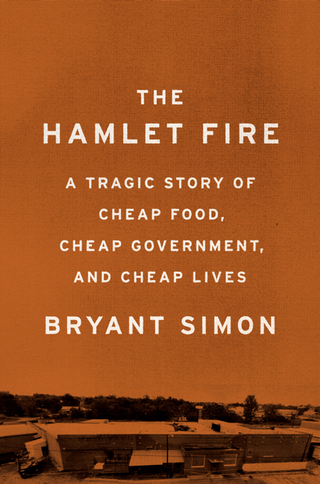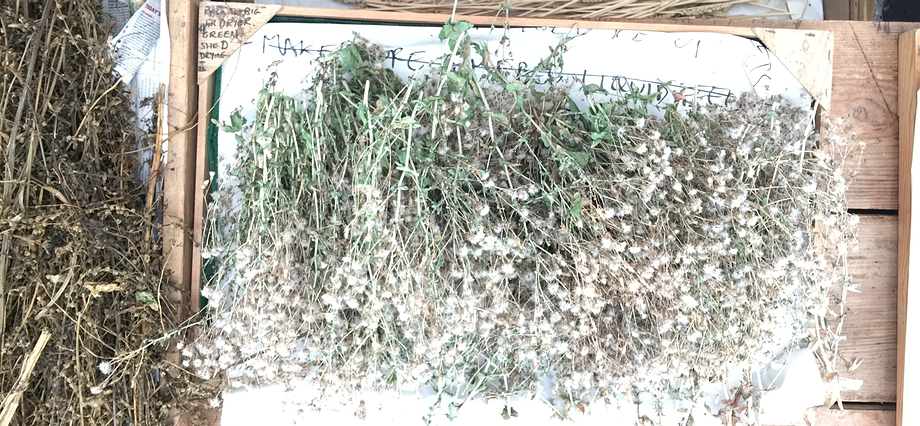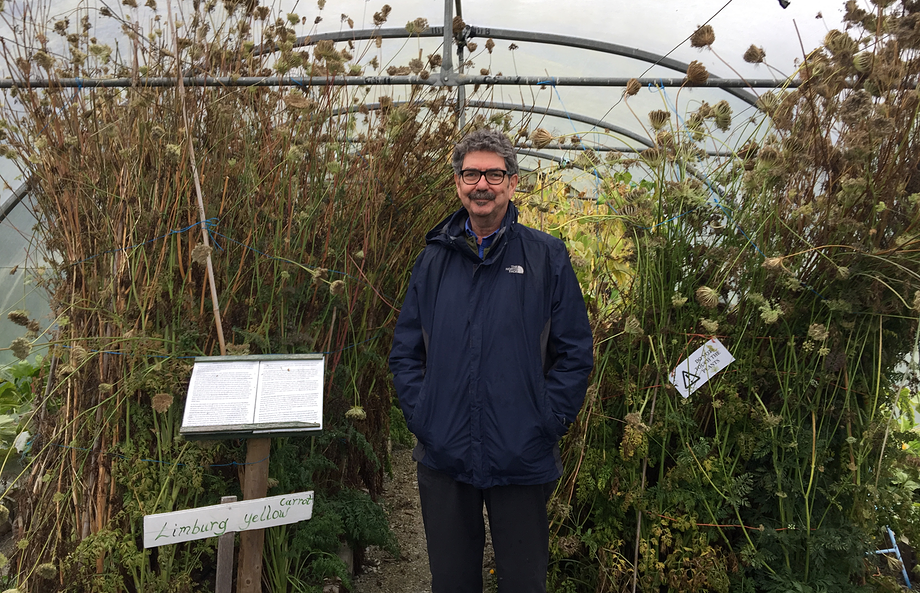It’s all very well saying that recipients of SNAP benefits should buy healthier food from farmers’ markets, where they can also get a discount. But two new studies say that almost two-thirds of poor people have never been to a farmers’ market and three quarters did not know they got a discount there. The solution? Social media campaigns.
The Hamlet Fire What an industrial accident tells us about industrial food

Podcast: Play in new window | Download (Duration: 23:25 — 19.1MB)
Subscribe: Google Podcasts | Spotify | Android | RSS | More
 Industrial accidents, tragic though they may be, can also lead to change. The fire at the Triangle Shirtwaist Factory in New York in 1911 is credited with changing a generation’s attitudes to worker safety, unions and regulation. Eighty years later, another industrial fire also killed workers because, like the Triangle fire, the doors were chained shut from the outside. That fire, at the Imperial Food Products plant in Hamlet, North Carolina, changed almost nothing.
Industrial accidents, tragic though they may be, can also lead to change. The fire at the Triangle Shirtwaist Factory in New York in 1911 is credited with changing a generation’s attitudes to worker safety, unions and regulation. Eighty years later, another industrial fire also killed workers because, like the Triangle fire, the doors were chained shut from the outside. That fire, at the Imperial Food Products plant in Hamlet, North Carolina, changed almost nothing.
In his new book The Hamlet Fire, historian Bryant Simon uses the fire to tell what he calls A Tragic Story of Cheap Food, Cheap Government and Cheap Lives. Simon’s thesis is essentially that the Hamlet fire wasn’t really an accident; circumstances conspired to make it likely, and if it hadn’t happened in Hamlet, it would have happened somewhere else. Among the points he makes: at the time of the fire North Carolina, a state that my imagination sees as resolutely rural, was the most industrialised of the United States. It had become so essentially by gutting control, regulation and inspection in order to attract jobs.
The USDA, responsible for the safety of the food people eat, agreed that a good way to keep out flies would be to lock the doors of the plant. But the North Carolina Occupational Safety and Health Administration had never once inspected the plant.
There’s a whole lot of Bryant Simon’s analysis that just wouldn’t fit comfortably in the episode. One nugget I really want to share here is a brief little scene from the first season of The Wire.
In a minute and a half, David Simon’s characters offer an object lesson in poultry economics, which Bryant Simon uses to explore the real history of the chicken nugget. And the dipping sauces are the key to overcoming chicken fatigue. Genius.
Notes
- Bryant Simon is a professor of history at Temple University in Philadelphia.
- His book The Hamlet Fire is available at Amazon and elsewhere.
- The music at the front is Hamlet Chicken Plant Disaster by Mojo Nixon and Jello Biafra, from their album Prairie Home Invasion.
Follow-up Friday
- Genetic limits threaten chickpeas, a globally critical food; hummus-eaters, be afraid!
- Huge levels of antibiotic use in US farming revealed; Brexiteers cheer?
Eat This Newsletter 071 Pu'er missus

Outside of China, bitterness doesn’t represent hardship – it is the hardship.
There’s bitterness and bitterness, of course, but fundamentally, I disagree; bitterness is an easily learned delight. That’s not the point of Angie Lee’s fascinating essay Going going gan in the Cleaver Quarterly. It is about bitterness, of course, but also about growing up Chinese in America and about the elusive quality of gan, bitterness that is more than a mere taste. I’ll leave you to savour the whole thing, but one of the lessons I took away from it is that I have probably been doing pu’er tea all wrong.
In 2005, on a visit to Kunming, I was given a huge block of pu’er tea. A dozen years later, I still have masses left. The fact is, I know almost nothing about teas. I know enough to enjoy them, but I’m no connoisseur. I go through phases, too, drinking a meditative pot of something at the close of the afternoon for a few weeks, then giving it up. The something is usually pu’er or genmaicha and, probably because I have never had a tutored tasting, I’ve never experienced anything like the sensations Angie Lee gets when she drinks pu’er. I shall continue to drink it, of course, but going forward I don’t suppose I’ll ever think of it in quite the same way.
Have you been taught to appreciate tea, or anything else? I’d love to hear about it.
After tea, coffee’s hot number. Why is the number 5282 closely identified with coffee? A clue: it’s all to do with phone numbers. And vanity. And biopiracy. Let’s not forget Thomas Alva Edison. And the potential of an outbreak of measles to disrupt communications. All unravelled at Peter Giuliani’s Pax Coffea.
A book review to chew on Books about food and cooking remain a bright spot in publishing, with the result that, for me at least, they’ve becoming a bit like cooking shows on TV; something to absorb, passively, rather than something to motivate action in the kitchen. I was very pleased, then, to read Cynthia Bertelsen’s review of Samin Nosrat’s Salt Fat Acid Heat. I’ve seen a couple of others, of course, but this review actually made me want to buy the book. I know that’s not supposed to be the point of reviews (or is it?), but it is as good a reason to read them as any.
In the full-length Eat This Newsletter — find it online and subscribe there or here — the hummus crisis that isn’t and the beef-buying public.
From little seeds … How one country is sharing its edible history

Podcast: Play in new window | Download (Duration: 18:49 — 15.7MB)
Subscribe: Google Podcasts | Spotify | Android | RSS | More
No apologies for returning to the Irish Seed Savers Association in County Clare. An organisation like that usually sprouts from one person’s enthusiasm and drive, and it flourishes with the commitment and passion of volunteers and staff for whom the work is much more than a job. I spoke to Anita Hayes, who started ISSA, and Eoin Keane, who looks after the apple collection, in an episode last October. Today Anita and some of the people who are carrying her work forward talk some more about seed saving and the Irish Seed Savers Association.

A little context may be in order too. Why does something like ISSA need to exist? Can’t gardeners just buy the seeds they want in the shops? Short answer: no. Many of the seeds on offer to gardeners in Europe are varieties that were bred for commercial production. And older varieties, selected because they offered qualities valuable to home growers, cannot legally be offered for sale.
It’s a long story, and one that many people find hard to believe, but in essence the European Common Catalogue, established in the 1960s, says that any variety needs to be registered in order to be offered for sale, and the registration fee is the same for all varieties. That makes registration a trivial cost for a big-selling commercial variety and a huge drain on the profitability of a variety that appeals to even thousands of gardeners. As a result, gardeners in Europe had to establish their own living genebanks, finding, multiplying and distributing seeds using a variety of wheezes.
Ever since the Common Catalogue was first published there have been various attempts to open it up, and there has been some small movement. These experiments, however, still have not properly addressed the needs of home gardeners. Until they do, the Irish Seed Savers Association and organisations like it have a valuable job to do.
Notes
- You can visit the Irish Seed Savers Association website and, better yet, the place itself.
- In addition to Anita Hayes, in the episode you heard from Tony Kay, Flora Barteau, Janet Gooberman, Áine Ni Fhlatharta and Felice Rae. Thanks to them, to Jennifer McConnell, (who took the picture of me in the polytunnel) and to everyone else who welcomed me to ISSA.
- In case you missed it, here’s the episode about Ireland’s apple collection.
- The banner photo show’s Felice Rae’s favourite lettuce seeds, drying before she gets her hands on them.
- You can now search the Common Catalogue online and even see all the varieties that have been deleted since the catalogue came into existence.
- The music is 12 and 6, one of the tracks from AnTara, a collaboration between Tommy Hayes and Matthew Noone.
- Full disclosure: I was closely involved with one of the first such seed libraries in the UK and had a very small part in helping ISSA get on its feet. I’ve also written about it ad nauseam. What I would like Europe to do about agricultural biodiversity is probably the least negative place to start, if you’ve a mind to.
